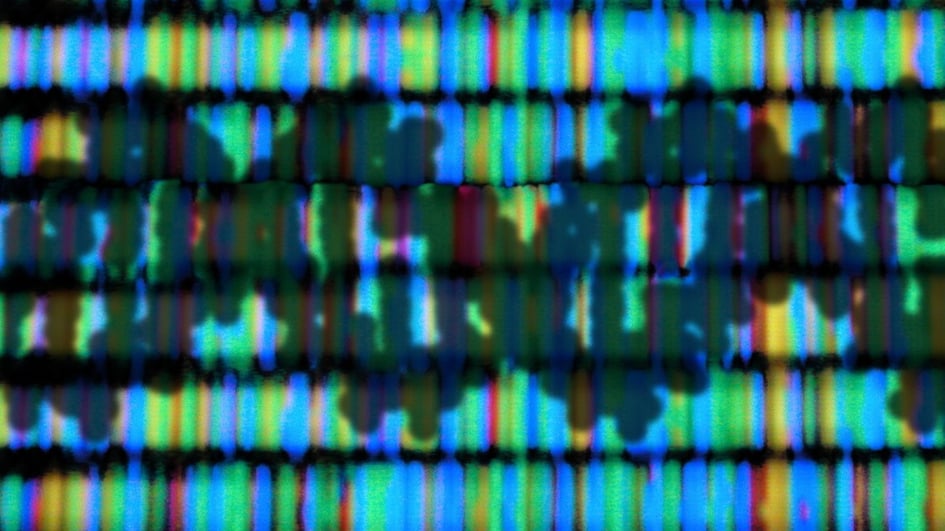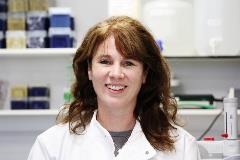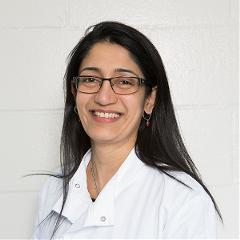
Image: Shadow of a DNA double helix on a background that shows the fluorescent banding of the sequencing output. Credit: Peter Artymiuk
Nearly a year on since the start of the pandemic, the need for our research remains urgent. Research continues in our labs, but we are now working in different ways. We’ve introduced new safety measures to protect staff and students from coronavirus and to make sure we can keep our labs open so that cancer patients don’t get left behind.
We’re also finding new ways to keep our donors up to date with our latest research. A year ago we met in the Royal Society of Chemistry for our Discovery Club event, but last week we met over Zoom. For the second virtual event, Discovery Club members went on a trip back in time and deep inside the cell with Professor Jessica Downs and Dr Navita Somaiah to explore how targeting cancer’s DNA weaknesses can unlock new treatments.
A trip back in time
In the 1960s, our researchers provided the first conclusive evidence that DNA damage is the fundamental cause of cancer, and showed the essential role of the thymus in our immune systems – a discovery that helped pave the way to modern immunotherapy.
Today, our researchers are advancing the understanding and targeting of the DNA damage repair system. Throughout the evening Professor Downs and Dr Somaiah shared their latest research on the molecular mechanisms of DNA repair, progress in new radiotherapy trials and personal stories of how their labs have adapted during lockdown to keep research going.
What is DNA damage and how does it work?
 Professor Downs’ team studies how healthy cells normally repair damaged DNA and how these repair pathways become defective in cancer creating a vulnerability that can be exploited by the approved design of appropriate drugs.
Professor Downs’ team studies how healthy cells normally repair damaged DNA and how these repair pathways become defective in cancer creating a vulnerability that can be exploited by the approved design of appropriate drugs.
DNA contains the genetic information to make individual cells. Despite DNA’s importance, it is surprisingly fragile. It can be damaged by exposure to sunlight and cigarette smoke, and even our everyday metabolism causes some damage. If this damage isn't repaired correctly, cells could die or be put back together incorrectly with mutations that change the genetic information. These genetic mutations are a hallmark of cancer.
To exploit DNA damage, researchers need to be able to find it, open it, repair it and put it back together again. Professor Down’s team is studying complexes which are key to opening DNA and making it available for repair.
Radiotherapy: Finding the right balance
 Dr Somaiah is a clinician scientist and an expert in the use of radiotherapy to treat cancer. Her talk focused on finding a balance in radiotherapy between killing as many tumour cells as possible while minimising side effects on normal tissues. One of the ways to achieve this balance is by fractionation, the process of dividing the total days of radiotherapy into daily doses, or fractions.
Dr Somaiah is a clinician scientist and an expert in the use of radiotherapy to treat cancer. Her talk focused on finding a balance in radiotherapy between killing as many tumour cells as possible while minimising side effects on normal tissues. One of the ways to achieve this balance is by fractionation, the process of dividing the total days of radiotherapy into daily doses, or fractions.
We have led practice-changing research on radiotherapy fractionation over the years. Most recently, our researchers led the FAST-Forward trial of about 4,000 women across the UK to compare a schedule of three weeks of daily radiotherapy against a one-week schedule. The long-term results of the trial demonstrating the effectiveness of a one-week schedule were released last March. This enabled us to safely deliver radiotherapy to all our breast cancer patients throughout the pandemic without any interruptions. This has now been adopted as a standard of care in the UK and is exceedingly changing practice internationally.
Now, Dr Somaiah and Professor Downs are working together to see how normal cells and tumour cells respond to this daily dose of radiation and how to further personalise radiotherapy.
Keeping lifesaving research going
Professor Paul Workman, our Chief Executive said donors’ support has been crucial to keep our labs open so that our lifesaving research can continue.
Professor Workman said: “We're really pleased to have the opportunity to join together again with Discovery Club members. And it's really great to see so many of you, our donors and valued supporters, here with us. Thank you again.
“Let's hope very much that as spring comes and vaccines begin to take effect, we will get to meet in person like we used to. I strongly believe that science will prevail over COVID. Indeed, science is also prevailing over cancer.”
Your ongoing support is vital
Philanthropy has played a key role in our progress over the years. Part of this generous community of donors, are our Discovery Club members who help us to drive forward our scientific strategy through philanthropic investment in key organisational priorities.
The events are an opportunity for members to hear from our leading scientists and clinicians about their work, and the ways that their support is making a difference.
Your continued support helps push forward our vital research, ensuring that new discoveries are brought rapidly into the clinic to benefit patients. If you would like to find out more, please contact Hannah Joyce, Deputy Director of Philanthropy.